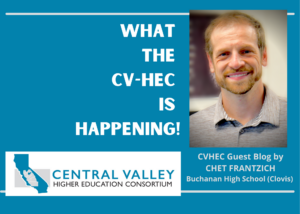WHAT THE CV-HEC IS HAPPENING GUEST BLOG (NOV. 2022): The Master’s Upskilling Program
Master’s Upskilling experience
was a game-changer
This month’s guest blog is presented by Chet Frantzich, an English teacher at Buchanan High School in Clovis who earned a master’s degree in June through CVHEC’s Master’s Upskilling Program. Chet earned his bachelor’s degree at Fresno State in 2010 (credential 2012) and has taught at BHS since 2018. He shares the value of the upskilling program and how it will benefit not just his personal and professional advancement but also his students through dual enrollment courses he plans to teach in the near future.
By Chet Frantzich
Buchanan High School
The Master’s Upskilling experience afforded me courtesy of the Central Valley Higher Education Consortium, National University and the Clovis Unified School District was a career altering one.
Not only did achieving my master’s in rhetoric open up pathways for me to teach dual enrollment courses and even courses at my local junior college, but it also impacted the way I teach. Graduating from the program has instilled in me a better sense of what my students need when it comes to functioning in college, yes, but also in life.  The program was a revelation regarding what truly matters in education and regarding how to teach the whole student.
The program was a revelation regarding what truly matters in education and regarding how to teach the whole student.
I knew going into the program that it would be demanding — not just the workload each class would require that would make it so, but also balancing teaching and extracurricular responsibilities. However, each class was so organized and each instructor so available and professional that it took hardly any time at all to fall into a kind of groove regarding the work. Before I knew it, the class was over, and hence, the program itself successfully completed.
Each class had a curriculum that was engaging and impactful, relevant to my cohort’s subject area, even to the point where I would read about a strategy or an idea on a Wednesday and apply that idea or enforce that strategy the very next week. It dawned on me early in the program that I was not just earning a postbaccalaureate degree; I was improving as a teacher day-by-day, week-by-week.
Here is an example of what made the program so navigable: from the outset of each class, we (each cohort member) knew exactly what the end goal was we were striving for. From week one on, we would engage with texts and perform activities and interact with one another and building ideas – one upon the other, never in isolation of each other – so that, come the final week of the class, a lot of the work we would have to do for our month’s final project has been completed.
Not only did this help me manage my time and make me feel like my work was consequential, but it also illuminated an idea: why don’t I do this with my students?
And so I did, almost right away. Not long after joining the cohort and being confronted with this realization, my students read a novel where I could show them the result we would be striving for before actually starting the book. This was not something foreign to me. What was new though, was the importance of revealing to people what they are doing, what the end result is, that way how they go about getting to that end destination is of the best quality possible.
The program elevated my teaching abilities in numerous ways, but understanding what my students needed to excel in their next stage of life was the chief way I improved. It is not that I did not know what they needed, but more so that I came to better understand how to get what they needed to them.
My mentor, Jeff Burdick, was a key piece in helping me understand how to help my students. His wisdom and experience in the college classroom revealed some things and affirmed others: that students need to be given a space to be creative, that they need to be shown tough love, that understanding how basic language works is essential to being a great communicator, that writing is the best way to teach people how to think.
Without the program, I think my grasp on those ideas would be decent, vague; graduating from the program, my grasp on those ideas is iron-like.
I cannot wait for the opportunity to teach dual enrollment classes. I have not been granted the chance to teach them yet, but when I do, I know I will be ready, and the Master’s program is a big reason why.
I do not think there is a topic or issue in the English classroom I cannot tackle, so expansive was the breadth of my experience earning my master’s. Going through the program is an experience I will never forget, and it is one I will forever be grateful for. There is no question that the program has made me a better, more well-rounded teacher, and it has inspired me to keep learning about my craft, that way my students get the best version of me year-to-year, month-to-month, week-to-week, day-to-day.
More specifically, I am confident they will find inspiration in the taking dual enrollment courses I hope to soon teach that will lay a foundation for a successful and meaningful higher education experience.
See Mr. Frantzich communicating with his student’s parents for Back to School Night 2021.




Leave a Reply
Want to join the discussion?Feel free to contribute!